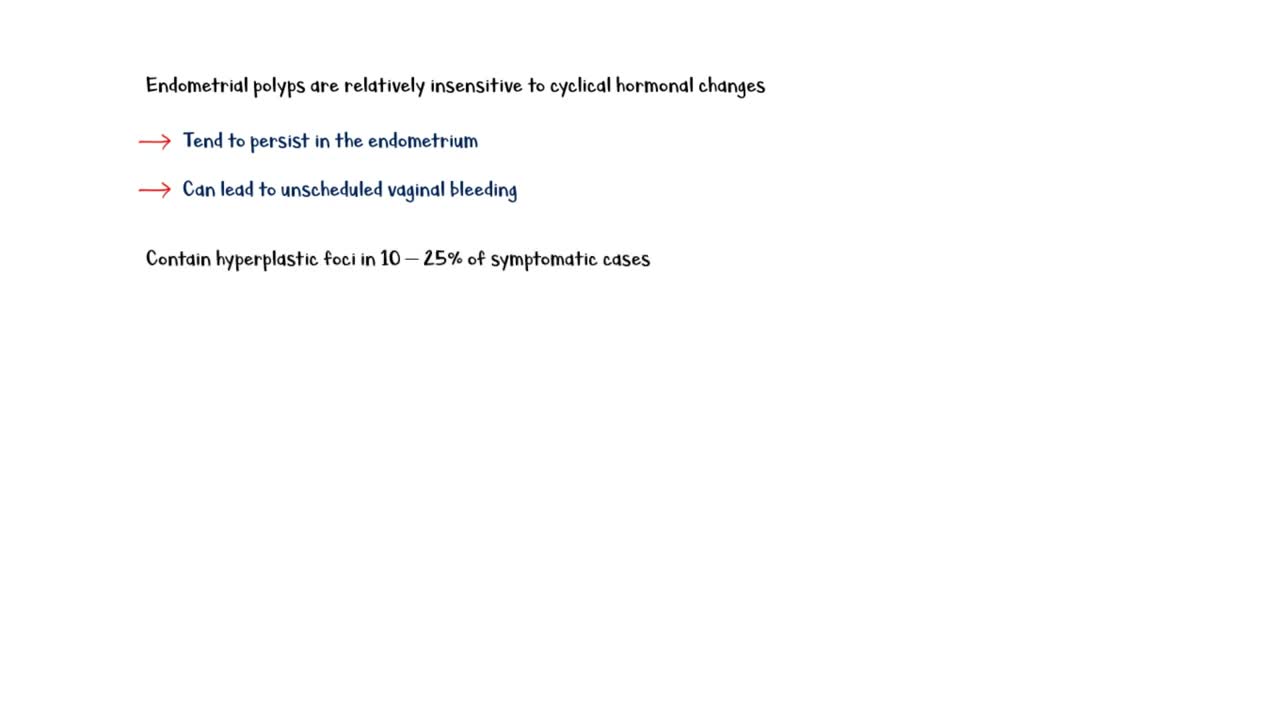Premium Only Content

Endometrial (Uterine) Polyps - Everything You Need To Know
Endometrial polyps are benign growths of endometrial glands, stroma, and blood vessels that protrude into the uterine cavity. In some individuals, they could be completely asymptomatic. Symptomatic polyps mainly present with abnormal uterine bleeding, which may include heavy menstrual bleeding; intermenstrual bleeding; and post-menopausal bleeding. In addition, endometrial polyps can adversely affect a woman’s fertility.
Endometrial polyps could be single, or multiple. And some of them may be pedunculated, while others are not. The exact cause of endometrial polyps is not known. However, they are associated with endometrial hyperplasia. Therefore, unopposed estrogen activity on the endometrium is considered a risk factor. Other risk factors for endometrial polyps include use of tamoxifen; a drug used to treat breast cancer. Obesity. Late entry to menopause. And hormone replacement therapy.
Endometrial polyps are relatively insensitive to cyclical hormonal changes. Therefore, they tend to persist in the endometrium, and can cause unscheduled vaginal bleeding. They contain hyperplastic foci in 10 to 25% of symptomatic cases. And rarely, they can transform into endometrial cancer.
Diagnosis of endometrial polyps can be done with transvaginal ultrasound. Hysteroscopy. And saline infusion sonohysterography.
Finally let’s come to the treatment. Smaller polyps usually resolve spontaneously, and do not require any treatment. For larger polyps, polypectomy can be done under either general, or local anesthesia, with the guidance of hysteroscopy. Polypectomy will alleviate abnormal uterine bleeding; improve fertility; and exclude the risk of endometrial cancer.
#endometrialpolyps #medtoday
endometrial polyps,endometrial polyp,uterine polyps,endometrial polyp removal,uterine polyps cancer symptoms,uterine polyps symptoms,endometrial polyp nhs,how to prevent polyps in uterus,endometrial polyp treatment,endometrial polyp causes
-
 LIVE
LIVE
CatfishedOnline
4 hours agoGoing Live With Allen Weekly Recap
149 watching -
 20:10
20:10
CartierFamily
5 hours agoAndrew Schulz DESTROYS Charlamagne’s WOKE Meltdown on DOGE & Elon Musk!
13.8K32 -
 1:36:39
1:36:39
Redacted News
3 hours agoBOMBSHELL EPSTEIN SH*T SHOW JUST DROPPED ON WASHINGTON, WHAT IS THIS? | Redacted w Clayton Morris
109K149 -
 2:03:31
2:03:31
Revenge of the Cis
4 hours agoEpisode 1453: Fat & Fit
26.6K3 -
 2:38:12
2:38:12
The White House
5 hours agoPresident Trump Holds a Press Conference with Prime Minister Keir Starmer of the United Kingdom
115K35 -
 1:01:04
1:01:04
In The Litter Box w/ Jewels & Catturd
1 day agoDrain the Swamp! | In the Litter Box w/ Jewels & Catturd – Ep. 751 – 2/27/2025
71.6K28 -
 1:11:24
1:11:24
Dr. Drew
6 hours agoNEW: Cardiac Arrest In Healthy Young People After mRNA w/ Nicolas Hulscher – Ask Dr. Drew
56.7K27 -
 4:24:53
4:24:53
Right Side Broadcasting Network
10 hours agoLIVE REPLAY: President Trump and UK Prime Minister Starmer Meet and Hold a Press Conference 2/27/25
151K47 -
 2:12:33
2:12:33
Adam Carolla
2 days agoKamala Harris vs. Trump Wildfire Response + Jillian Michaels on Motherhood/Ayahuasca & Sperm Donors!
48.8K14 -
 4:18:28
4:18:28
Barry Cunningham
9 hours agoTRUMP DAILY BRIEFING: PRESIDENT TRUMP AND UK PRIME MINISTER STARMER HOLD PRESS CONFERENCE!
71.1K15